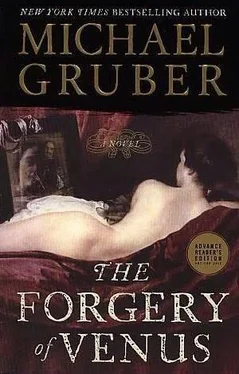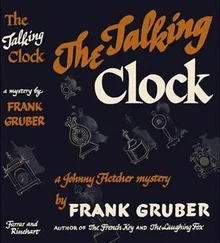For the next week I was a complete wreck, afraid to go to sleep, afraid I might wake up again not me. I spent most of these first days after my return wandering along the river, up to Castel Sant’Angelo and down to Ponte Testaccio, exhausting myself, drinking in a bar before returning home. Most of me was still in 1650: I could recall dozens, hundreds of details, more than I could recollect of the last year of my so-called real life. Maybe the seventeenth century made for a denser, more vivid existence: I mean street scenes, talking to cardinals, servants, what I ate at banquets, the talk at diplomatic receptions, being with Leonora.
Yeah, her. My body, my mind, my heart, if you want to call it that, was burdened with a relationship that I never had, with a woman who died over three hundred years ago. So what was the real story? Obviously, an unprecedented reaction to salvinorin, combined with amnesia, also drug related. My brain was damaged, we already knew that, and since the only deep emotional attachment I’ve ever had was to Lotte, somehow I conflated all that with thinking about Velázquez and came up with this imagined life, and there you had it, an explanation that Shelly Zubkoff would swallow without gagging.
Another reason for staying out of the house was that Sophia started crying nearly every time she looked at me, and it freaked me out, because she’d had a love affair with a ghost, a demon lover, while I’d been making love to Leonora three centuries ago.
One day she wasn’t there and her mother told me she’d gone with the kid to visit friends in Bologna. The signora had been crying too, I could see, and through the barrier of language she let me know that I had been a complete shitbag.
You have to understand that part of the problem here was my complete isolation. I’d checked my cell phone after coming out of the past and learned that there were no messages at all on it. Not one. Jackie Moreau was dead; Mark was, well, Mark, not a sympathetic ear; Charlie was God knew where in Africa, and Lotte was incommunicado. It was like I’d been jailed by the secret police.
So I called my ex-wife one evening, and as soon as she heard my voice she said, “The only thing I want to hear from you is that you’re getting psychiatric help.”
I said, “Hey, I’m planning to, honestly, but look-I’ve, um, been painting like mad and Krebs is coming tomorrow to check out the work and if he likes it, that’s a million bucks to me. Lotte, imagine what we’re going to do with-”
But she wouldn’t listen. She said, “You know, it makes no sense to talk to a maniac, and it hurts me to hear you rave like this. Call me when you are getting the medical help you need.”
And she hung up. Isolation complete, then. Yes, good thing I didn’t tell her about what I’d been doing, or imagining I was doing, for the last three months. She might’ve really been annoyed. So, okay, I was crazy, but you know, just then I didn’t feel crazy. I mean, I was functional as an artist, because apparently I had pulled off this huge coup of a forgery. I felt crazy in New York, but now I didn’t. And frankly I was dazzled by the money and the promise of more. It’s the rule that if you’re rich enough you can’t be that crazy. So I really looked forward to Krebs coming for that reason, and also because, now that I thought about it, he was my only remaining friend.
Now came the big day. That morning Baldassare went out and brought my picture back from the secret forgery lab. He set it up on a display easel in the parlor, covered with a black velvet cloth, and he was guarding it like a dragon, wouldn’t let anyone have a peek before Krebs arrived. Franco drove to the airport to meet him, and while he did that I got fed up with the tension in the house and went out to take a long walk, east to the Tiber and along the Ripa and back through the Porta Portese in the ruins of the old walls. It wasn’t quite warm yet but spring was happening in Rome; you could smell the river and the trees on the boulevards were greening up and blossoming, if they were that kind of tree.
When I returned to the house on Santini I saw that the Mercedes was already parked outside and I hurried in. Krebs was there, in the parlor, with Franco and Baldassare and a man I didn’t recognize, a small, stout, olive-skinned guy with dark-rimmed glasses and the air of an academic. They were all standing around drinking Prosecco, and I saw that the drape was still on the painting.
Krebs hailed me as I came in, embraced me warmly, and said that he’d insisted they wait until I came back for the unveiling. He introduced the stranger as Dr. Vicencio de Salinas, a curator from the Palacio de Livia, the private collection of the duchess of Alba, which kind of puzzled me at the time, because I thought, Hey, isn’t this a little premature, showing the thing to an expert before the boss even had a look?
Then Baldassare pulled the drape off with a flourish and there were gasps all around. All three of us-Krebs, Salinas, and me-surged forward to look at it more closely and bumped shoulders, and I kind of pulled back and let them get the best look. They were the customers. But I’d seen enough to understand that Baldassare had worked a wonder. Oil paint takes years to really cure up and dry, and it changes its appearance during that time; even the things I’d done as a kid still looked like the contemporary objects they in fact were. But this son of a bitch looked old, and it had the palpable authority that old things have. It looked cracked and heavy with age, like every painting from the seventeenth century you see in museums, and I had a brief moment of temporal vertigo, as if I’d painted it in the seventeenth century for real.
The Spaniard inspected the painting at various distances for what seemed a long time. At last he turned to Krebs with a small smile, nodding his head-reluctantly, it seemed to me.
“Well? You said it couldn’t be done,” said Krebs. “What do you think now?”
Salinas shrugged and answered, “Frankly, I admit to being astounded. The brushwork, the colors, that glow on the skin are all entirely true to the Rokeby Venus . And the…the preparation is also very fine; the craqueleur seems flawless on initial inspection.”
Krebs clapped Baldassare heartily on the back. “Yes! Bravo Signor Baldassare!”
And Salinas went on, “Subject, as I say, to technical examination, the pigments and so forth, I would have no trouble in passing this as genuine.”
I stood there amid the smiles, and no one looked at me or patted me on the back, and I figured it was something like what went down with Castelli’s faked Tiepolo-they were practicing pretending that it was real. I couldn’t study it closely myself. When I tried to a pain started across my eyes and my vision blurred a little and I had to sit down.
I looked up at Krebs again and he was talking with Salinas, something about the exact dimensions of the painting, and Krebs assured him that it was right to a tenth of a millimeter and told him to get on with taking his samples, because he had to get back to Madrid as soon as possible so as not to be missed at the museum.
Salinas opened a briefcase from which he removed a set of binocular goggles, a high-intensity headlamp, and a small black container about the size of an eyeglass case. He put on the goggles and the lamp, switched it on, turning himself into something like ET on a spelunking expedition. He approached the painting and from his little case drew a shiny small tool.
“He’s taking a core to analyze the paint layers,” Krebs said. “Tiny, and virtually invisible. He’ll check the pigments and the ground for age and anachronism. Which of course he will not find.”
“I hope not. What was all that about exact dimensions?”
Читать дальше












